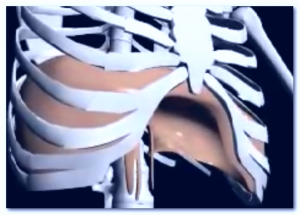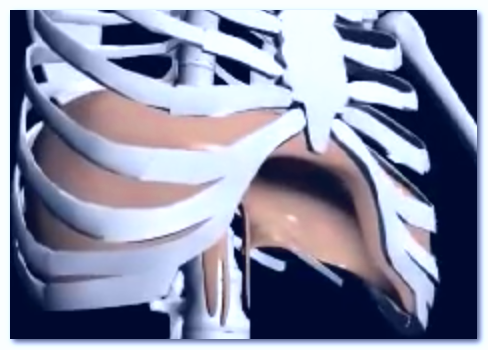A diaphragm spasm can refer to any of the below listed conditions:
- Temporary or transient diaphragm spasm
- Hiccups or synchronous diaphragm spasm or flutter
- Diaphragm strain
- Bornholm disease, i.e., epidemic transient diaphragm spasm
1. Temporary or transient diaphragm spasm
- Commonly referred to as ‘getting the wind knocked out of you,’ this form of diaphragm spasm is caused due to sudden application or pressure or force on the solar plexus. It can occur due to a fall on the back, a blow to the abdominal area, or in contact sports. There may be temporary diaphragm paralysis which is what causes minor breathing problems. It is temporary and requires no treatment.
2. Hiccups or synchronous diaphragm spasm or flutter
A hiccup refers to spontaneous contraction of the diaphragm which may recur many time in a single minute. The involuntary action of a hiccup is marked by a reflex arc, which after activating, leads to powerful diaphragm contractions eventually followed by closing of the vocal cords; this is what causes the well-known ‘hic’ sound.
A hiccup features a specific rhythm wherein it may occur in episodes or as a single act. This rhythm and/or the time between two hiccups often remains the same.
Most cases of hiccups tend to resolve on their own after some time. Home remedies can help facilitate faster relief from hiccups. Chronic or prolonged instances may need medical assistance.

Symptoms of a hiccup
Some of the signs and symptoms accompanying a hiccup caused due to a diaphragm spasm are listed below:
- Hiccups may occur as an audible squeak, chirp, or a ‘hic’ sound. If it is suppressed, then patients may elicit a quick inhaling sniff, sigh, or gasp.
- Respiratory diaphragm spasms may occur as a solitary or a series of hiccups with variable duration and time spacing.
- There may be a minor and involuntary tremor of the abdomen, shoulder, throat, or the entire body.
- Some patients may find hiccups to be painful or distressing, with occasional or frequent respiratory or breathing interruptions, and/or unexpected brief pain in the chest, throat, or abdomen.
Causes of diaphragm spasm related hiccup
Hiccups related diaphragm spasm can occur due to varied factors. Doctors usually check the breathing pattern of patients to verify the causes of chronic hiccups. Normally, the inhaled air passes through the nose, mouth, pharynx, glottis, larynx, trachea, and finally goes to the lungs. Such flow of air from and to the lungs is assisted by the diaphragm. It moves down during inhalation and up during exhalation. Phrenic nerves help control such movement of the diaphragm. Irritation of these nerves is what eventually causes diaphragm spasm marked by quick and short breaths that get interrupted periodically due to sudden epiglottis closing, which is what causes the classic hiccup sound.
Irritation of the phrenic nerves may occur due varied factors such as listed below:
- A full stomach caused due to increased swallowing of air or rapid eating. A full stomach may be distended thereby exerting increased pressure against the nerves and irritating them. Quickly eating large amounts of food can by itself also cause involuntary movement of the diaphragm muscles, because large quantities of air also usually get swallowed in the process, thereby causing the muscles to contract and cause diaphragm spasm. Newborns tend to intake lots of air when feeding, which is why they commonly suffer from hiccups.
- The phrenic nerves can also get irritated due to intake of hot and spicy foods. Such hiccups often tend to last for a minute or so.
- Brain stem or medulla lesions occurring in the region lateral and ventral to the nucleus and the tractus solitarius can also irritate the phrenic nerves and cause hiccups.
- Excessive intake of alcohol or alcoholic drinks, or carbonated beverages, especially during meals can also irritate the phrenic nerves and cause hiccups. Increased smoking is another cause.
- Eating hot meals or drinking chilled or very cold beverages can also cause unexpected contraction of the diaphragm. Diaphragm spasm related hiccups may also occur when you switch from eating hot foods to drinking cold beverages, or vice versa.
- Another common cause of diaphragm spasm is indigestion. Nil or minor physical activity post heavy meals can cause indigestion. People who overeat regularly often tend to suffer from regular bouts of hiccups.
- Numerous everyday factors such as coughing; use of opiate drugs; intake of dry breads; laughing; and/or extreme emotions like anxiety, fear, joy, excitement, and euphoria can also trigger diaphragm spasm associated hiccups.
- Underlying conditions like kidney failure, stroke, meningitis, multiple sclerosis, gastro-esophageal reflux, and nerve damage can also trigger diaphragm spasm.
Treatment of hiccups
- Hiccups usually vanish on their own; home remedies like drinking water, breathing into a bag, etc. may help treat it or reduce the duration of the diaphragm spasm related hiccup.
- Chronic cases of hiccups need to be checked by a doctor, who will diagnose the underlying cause and offer relevant treatment options, such as medications, change of diets, lifestyle changes, etc.
3. Diaphragm strain
- Diaphragm strain is a form of diaphragm spasm which can cause hiatal hernia, wherein the stomach may protrude through the diaphragm. In addition to diaphragm muscle weakness and strain, patients may also suffer from acid reflux, circulatory and heart problems, etc.
- Visit a doctor to treat hiatal hernia.
4. Bornholm disease, i.e., epidemic transient diaphragm spasm
- This disease is caused due to infection by the Coxsackie B virus or other types of viruses like Coxsackie A virus and echovirus, etc. The Coxsackie B virus spreads from a patient to others via contact such as sharing of drink containers, etc. Epidemics occur all through the year in tropical areas and during warm weather in temperate regions.
- In addition to diaphragm spasm, patients may suffer from headaches, fever, and intense pain on one side of the lower chest. Even minor chest movements can cause intense pain, resulting in breathing difficulties. The associated diaphragm spasm episodes are unexpected and sudden.
- Bornholm disease is not a life-threatening illness. It is treated with non-steroidal anti-inflammatory drugs. Associated muscle pain can be relieved with heat application and warm compresses. Relapse of the condition is quite common.


whoah this blog is wonderful i love reading your articles. Keep up the good work! You know, many people are hunting around for this info, you can aid them greatly.